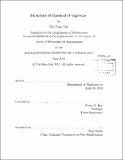| dc.description.abstract | The first part of the thesis provides three equivalent definitions of a classical finite W-algebra Wfin(g, f) and two equivalent definitions of a classical affine W-algebra W(g, f, k) associated to a Lie algebra g, a nilpotent element f and k [epsilon] C. A classical affine W-algebra W(g, f, k) has a Hamiltonian operator H and the H-twisted Zhu algebra of W(g, f, k) is the classical finite W-algebra Wfin (9, f). A classical finite (resp. affine) W-algebra is isomorphic to a polynomial (resp. differential polynomial) ring. I compute Poisson brackets (resp. Poisson [lambda]-brackets) between generating elements of a classical finite (resp. affine) W-algebra when f is a minimal nilpotent. In the second part, I introduce a classical finite (resp. affine) fractional W-algebra Wfin(g, Am, k) (resp. Wfin(g, Am,k)), where Am = -fz- m - pz-m-1 [epsilon] g((z)) for a certain p [epsilon] g and an integer m >/= 0. If m = 0, then the algebra Wfin(g, Am, k) (resp. W(g, Am, k)) is isomorphic to Wfin(g, f) (resp. W(g, f, k)). I show that an affine fractional W-algebra W(g, Am, k) has a Hamiltonian operator H and the H-twisted Zhu-algebra of W(g, Am, k) is Wfin(g, Am, k). As in ordinary W-algebras cases, a classical finite (resp. affine) fractional W-algebra is isomorphic to a polynomial (resp. differential polynomial) ring. In particular, I show explicit forms of generators and compute brackets (resp.[lambda]-brackets) between them when f is a minimal nilpotent. Using generalized Drinfel'd and Sokolov reduction, I find an infinite sequence of integrable systems related to an affine fractional W-algebra when Am is a semisimple element in g((z)). In the last part, I introduce generalized Drinfeld-Sokolov reductions and Hamiltonian ODEs associated to classical finite W-algebras and finite fractional W-algebras. Also, I find integrals of motion of the Hamiltonian ODEs using Drinfel'd-Sokolov reductions. It is an open problem whether these equations are Lenard integrable. | en_US |
